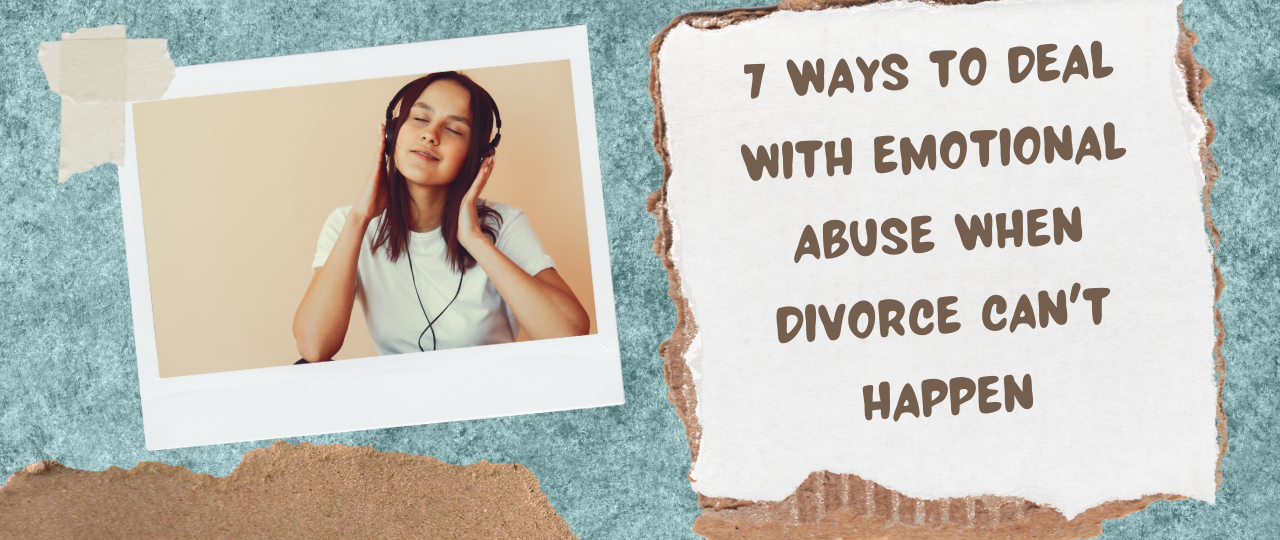I was in an abusive marriage. I scared. I was depressed. I had nobody to help me. When I told someone, I said "I think I am being abused" the person said "yeah right" in disbelief. Does this sound like you? You feel alone. sure there are wonderful support groups of facebook, but for me, I didn't say on them long only because I was worried my now ex (when were together back then) would find me. I want to say that you are NOT alone. Before writing any further I must encourage you, if at all possible, to consider divorce if you’ve found yourself in an emotionally abusive marriage.
If you have to stay I hope it is because of financial reasons and not out of the hope you can fix your abuser.
Since you’ve made the decision to stay in an abusive marriage, Here are some important steps you can take that will help you cope with the abuse. At the very least these are tips that will keep you in survival mode until you finally make the decision to leave.
7 Ways to Deal With Emotional Abuse When Divorce Can't Happen
1. Admit that there is a problem:
It’s common in emotionally abusive relationships for the victim to take responsibility or, feel they in some way, do something to cause the abuse. It’s important to examine your own beliefs about what is happening in your marriage and not take responsibility for destructive actions you play no role in.
Admitting to yourself that there is a problem, that you are being emotionally abused is your first step in coping with and solving a problem.
2. Accept that you can’t control whether or not the abuse continues:
You can’t fix the abuser, and you deciding to stay and cope with the abuse, doesn’t mean the abuse will stop. If you stay in the marriage, keep your expectations low when it comes to the abuser changing. You can change how you react to the abuse, what you think about the abuse and, in turn, the negative impact the abuse has on you. You can’t, however, wish away the abuse.
3. Give yourself an out:
When your abuser becomes aware of the change in the way you cope with their abuse, they may ratchet up the abuse. Don’t say to yourself, “I’m staying because I can cope.” Say to yourself, “I’m staying until I can no longer cope.
You have to be sensible, you want to save your marriage, you want the abuser to change but, if the changes you make don’t promote change in the abuser, the day will come when you’ll have no choice but to protect yourself by leaving.
4. Try to understand the abuse:
Not as a way of excusing the abuse. But, if you are better able to understand why the abuser, abuses you will gain insight into where the behavior is coming from and that insight can go a long way in helping you cope with the abuse.
This is important for two reasons. First, if you learn that your spouse was exposed to trauma during childhood, that knowledge can help you view the abuser in a less threatening way. Their anger begins to make sense, become diminished and less hurtful when you understand it is coming from someone who is wounded.
Secondly, if your abuser is suffering from depression, anxiety or PTSD encouraging him/her to seek treatment not only helps you cope, it could help bring an end to the emotional abuse if they seek treatment.
5. The abuse isn’t about you:
People who abuse others have issues. That is an understatement! Most abusers are the way they are because they are avoiding dealing with their own issues by acting out against other people. You may be on the receiving end of the abuse but, it is the abuser who needs to be fixed not you. Knowing that you aren’t the problem makes it easier for you to brush off their behavior and not internalize it and make it about you.
6. Confide in someone you trust:
Being in an abusive relationship can cause great shame. This shame can keep a victim from confiding in someone who can become a support system for them. You don’t have to confide in everyone you know but, having one or two close friends to discuss the problem with will keep you from feeling alone and help you feel like others have your back.
7. Have a conversation with your spouse:
But, don’t expect any miracles. If you didn’t have hope the marriage could change, you would divorce your abuser. Given the fact that you are staying means you are hoping for change. You can’t expect change if you are not honest with the person who needs to change. Tell your spouse that you are going to stop allow the abuse to affect you, that you’ve set a time limit and you hope the changes you make, will promote change in him/her.
When you confront an abuser you want to remain calm and level headed. You aren’t giving ultimatums, you are sharing your plan in the hopes that they understand and get on board.
I’m going to assume since you are reading this article that you’ve done your homework when it comes to emotional abuse. Since you have, you know that if your plan is to stay in the marriage you should proceed with caution especially if you feel significant damage has already been done by the abuse.











